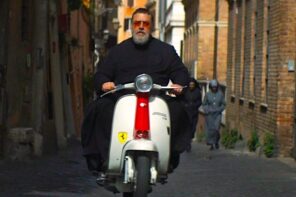It’s official—with Ross Douthat’s conspiracy-drenched Sunday column, the idea that the synod is somehow a “plot to change Catholicism” has leapt from the far-right Catholic fringe to the conservative Catholic mainstream.
Conservatives have been pushing the idea for months that the synod isn’t just a meeting of bishops to discuss how the church’s teachings on the family can be made more relevant for Catholics, but a Machiavellian plot by Pope Francis and his allies to change church doctrine. As evidence, as per Douthat, they offer the fact that Francis has changed the synod procedures to allow for actual discussion about issues like the pastoral treatment of divorced and remarried Catholics or gay Catholics:
The documents guiding the synod have been written with that in mind. The pope has made appointments to the synod’s ranks with that goal in mind. … The churchmen charged with writing the final synod report have been selected with that goal in mind.
As Douthat himself notes, with the “ranks of Catholic bishops includ[ing] so many Benedict XVI and John Paul II-appointed conservatives,” it would have been fundamentally pointless to hold a purely “democratic” synod in which the majority of the existing bishops drafted the synod document and controlled the discussion and final report.
The result would have been a synod like any of the other synods over the past 35 years: the bishops would assemble and give their pre-written “interventions” affirming current church policy, agree that current church policy was awesome, eat some fabulous meals in Rome, and then go home. (And for the record, conservatives have argued for years that the church isn’t a democracy.)
What Douthat doesn’t explain is why it wasn’t a “plot” for Pope John Paul II to stack the bishops’ ranks with conservatives; purge liberal bishops, theologians and dissenters from the church; declare teachings like the prohibition against women priests fundamentally unchangeable by future pontiffs; and then tee-up his own right-hand man to be the next pope to solidify his preferred reading of church doctrine.
The evidence for anything that might properly be called a “plot” is so thin that Douthat is forced to deploy signifiers of conspiracy and Machiavellian ill-intent to make his case. He knocks Francis for his “ostentatious humility,” (apparently he preferred Benedict’s flair for papal bling, including his red shoes or fur-lined, ermine-trimmed winter cape). He speaks of Francis’ “maneuvers” and calls him the “chief plotter.”
And he repeats the question of conservative journalist Edward Pentin’s recent book about whether last year’s synod was “rigged,” echoing its conspiratorial overtones. Of course he fails to note that Pentin’s book, which amounted to an elaborate rehashing of that question, offered no proof of any “rigging” beyond a change in procedures to give the more progressive proposals and bishops who back them a chance to be heard in a synod where they’re still vastly outnumbered by conservatives.
Douthat likewise ignores Pope Paul VI’s apostolic letter Apostolica Sollicitudo, which established the Synod of Bishops and the procedures for their meetings which states that the responsibilities of the pontiff regarding synods are:
- To call the Synod into session whenever he feels this will be advisable and to designate the place where the meetings are to be held;
- To ratify the election of members described in articles V and VIII;
- To determine matters for discussion at least six months before the Synod is to meet, if that be possible;
- To see to it that the material to be discussed is sent to those who ought to be concerned about the discussion of these matters;
- To set the agenda;
- To preside over the Synod personally or through someone else.
In other words: the pope is clearly intended to preside over the content and conduct of the synod. The letter also gives the pontiff latitude over the composition of the synod in Articles IX and X:
In choosing those who are to represent the episcopal Conferences of one or a number of nations and the religious institutes in the Synod of Bishops, great attention should be paid not just to the general knowledge and wisdom of individuals, but also to their theoretical and practical knowledge of the matter which the Synod is to take up.
The Supreme Pontiff may, if he so chooses, increase the number of members of the Synod of Bishops by adding bishops, or religious to represent the religious institutes, or clerics who are experts, to the extent of fifteen percent of the total number of the members mentioned in articles V and VIII.
Despite this, Douthat assures us that “as a Catholic,” he expects “the plot to ultimately fail; where the pope and the historic faith seem to be in tension, my bet is on the faith.”
It’s a measure of how deeply conservative Catholics identify the “faith” with the doctrinal orthodoxy of JP II and Benedict that Douthat actually believes he speaks for Catholics more authentically than Pope Francis.




